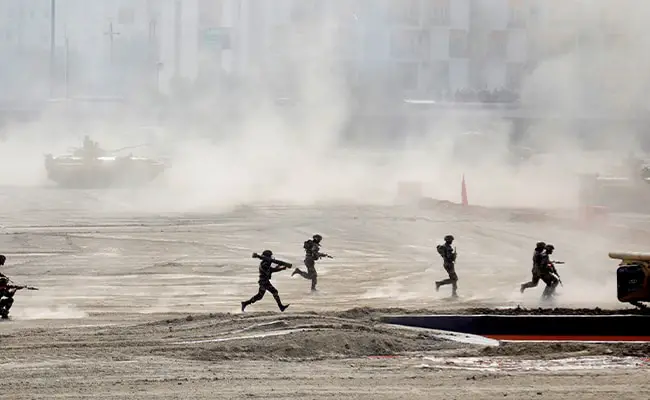Indigenization towards empowerment is an ongoing journey, as stated by the Army chief during the NDTV Defence Summit in New Delhi. General Manoj Pande emphasized how disruptive technology is reshaping modern warfare and challenging the traditional combat ratios used to gauge military strength and superiority between nations.
From the utilization of tanks in World War 1 to the advancements in supersonic fighter jets post-World War 2, disruptive technology has consistently altered the dynamics between factions. At the summit, General Pande underscored the significance of access to such technology by non-state actors, posing a security challenge for the nation. He also highlighted the incorporation of information, cyber, and space warfare into the realm of conflicts, noting that adversaries equipped with such technology can initiate low-threshold conflicts.
During the summit, former US Deputy National Security Advisor Nadia Schadlow emphasized that the space between war and peace is teeming with political, economic, and security competitions that demand continuous attention.
The proliferation of technology has facilitated the easy acquisition of AI, enabling targeted attacks to be directed with precision. In conflicts such as the Russia-Ukraine war and attacks in the Red Sea, the use of semi-autonomous and autonomous drones powered by AI has compelled nations to adapt their strategies. Notably, the US and UK are supporting Ukraine with AI-driven drones for precision strikes. Moreover, Houthi rebels, supported by Yemen, have utilized autonomous platforms to target ships in the Gulf.
Off-the-shelf disruptive technologies have empowered conventionally weaker states to engage in cost-effective and sustainable warfare, thereby prolonging their presence on the battlefield. For instance, Israel’s Iron Dome air defense system harnesses AI to intercept incoming rockets. Similarly, during the 2021 Israeli offensive against Palestinians, AI tools like ‘Gospel’, ‘Alchemist’, and ‘Depth of Wisdom’ were employed to conduct precise strikes in Gaza.
The threat of cyberattacks on state infrastructure remains a persistent challenge, as illustrated by incidents such as the malware attack on AIIMS Delhi. This attack, originating from China, infiltrated several servers, underscoring the vulnerability of critical systems to malicious actors.
Concerns over the impact of Deep Fakes on information warfare have been raised, emphasizing the need to combat the spread of misinformation during crises. The integration of information warfare alongside traditional firepower is crucial in establishing psychological dominance over adversaries.
In line with the emphasis on technological advancement, the Army chief highlighted the importance of indigenizing critical technologies to foster a domestic ecosystem and reduce reliance on foreign entities. Initiatives like the ADITI scheme launched by Defence Minister Rajnath Singh aim to accelerate innovation in deep-tech technologies necessary for future warfare.
In conclusion, the shift towards empowerment through indigenization reflects a proactive approach to bolstering national security in the face of evolving geopolitical challenges. By harnessing disruptive technologies and fostering innovation, nations can strive to be future-ready and resilient in the ever-changing landscape of modern warfare.

